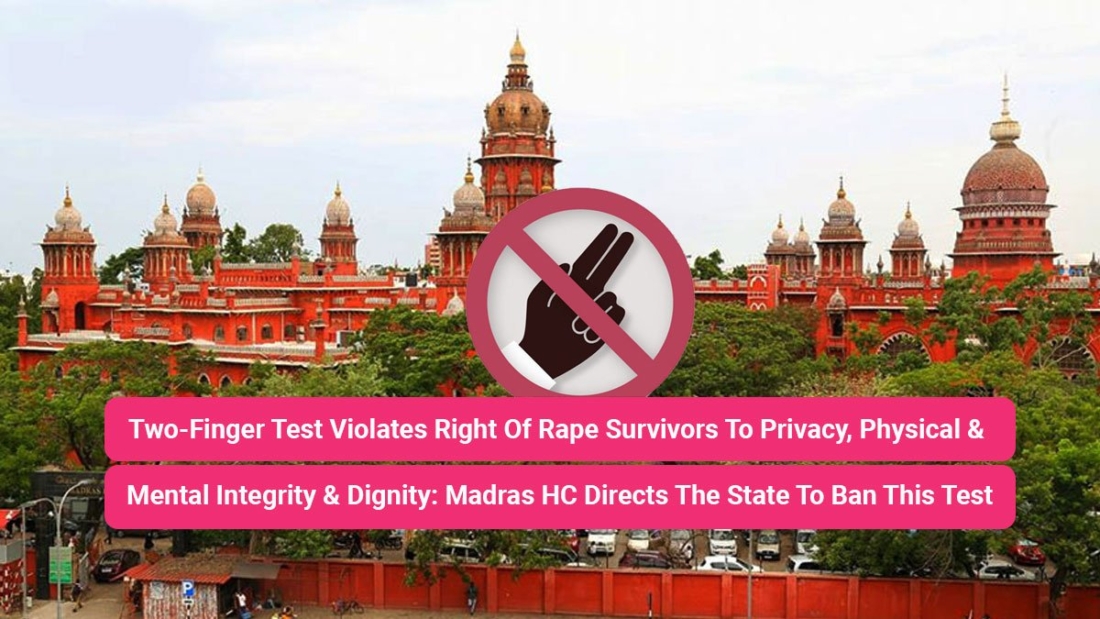In the case of R.G. vs. The State represented by the Inspector of Police, the Madras High Court on 21st April 2022 issued a direction to the State Government to ban the practice of two-finger test on victims of sexual offences by the medical professionals forthwith.
Facts of the leading case:
In the prosecution case, the accused, who owned a tailoring shop, befriended the victim, a juvenile girl of about 16 years old when she was undergoing tailoring training. In December 2020, the accused approached the victim’s house and convinced her to meet him. Under the guise of getting some old clothes stitched, the victim girl left the house. When she failed to return, her father filed a report with the police, who later discovered her.
The victim was taken to the hospital, where it was discovered that the accused had penetrative sexual contact with her. The witnesses’ statements and accused confession were recorded, and the accused was detained. The victim girl’s statement was recorded under Section 164 (Recording of confessions and statements) of the Code of Criminal Procedure Code (CrPC) The charge sheet was laid after the investigation was completed.
The trial court found accused guilty under Section 5(l) (whoever commits penetrative sexual assault on the child more than once or repeatedly) read with Section 6 (Punishment for aggravated penetrative sexual assault) of the POCSO Act for having repeated intercourse with the minor girl. The offender was also found guilty of kidnapping the minor girl and was charged under Section 363 (Punishment for kidnapping) of the Indian Penal Code.
Aggrieved by the decision of the trial court, he filed an appeal under Section 374(2) (Any person convicted on a trial held by a Sessions Judge or an Additional Sessions Judge or on a trial held by any other court in which a sentence of imprisonment for more than seven years may appeal to the High Court) of the CrPC in the High Court.
Counsels Arguments:
The Counsel for the accused claimed that the witnesses’ account of the occurrence was filled with discrepancies. Furthermore, there was no indication of penetrative sexual assault in the victim’s Section 164 statement. As a result, the victim’s vocular evidence that contradicts the statement should not be considered. He further claimed that the accident report said that the hymen was torn, despite the fact that the doctor testified that the hymen was intact. Such inconsistencies would cast doubt on the prosecution’s case’s credibility.
It was submitted that the victim girl had gone with the accused on her own and that the kidnapping argument could not be accepted. He further emphasized that the victim was a 16-year-old girl, and that the relationship was consensual and based on the promise of marriage, and hence could not be considered a forced sexual relationship.
The Counsel for the State, on the other hand, claimed that the victim girl’s vocular evidence is plain and categoric. Furthermore, the victim girl was not cross-examined. The offender cannot rely on the 164 statement to whittle down the effect of the victim girl’s vocular evidence in the absence of such cross-examination pointing out the contradictions in the statement provided under Section 164. The Counsel further stated that the Supreme Court has deprecated the two-figure test and it is high time that the practice must be stopped
Observation of the Court:
- The Court did not find any kind of inducement made out by the accused in the formation of the intention of the minor to leave the house of her lawful guardian (father) and the same is justified by the conduct of the minor which clearly shows that she had gone with the accused on her own volition. She never tried to escape from the detention of the accused. Hence, the question of kidnapping was unjustified.
- It was opined that the two-finger test and its interpretation violate the rape survivors’ right to privacy, physical and mental integrity, and dignity. As a result, even if the report is positive, this test cannot ipso facto lead to a presumption of consent. Thus, the Court ordered the State to ban this test.
- The Court held that, despite the fact that there was consent, the trial court’s order was lawful in relation to the POCSO Act offences. The inconsistencies in Section 164 of the CrPC statement and oral evidence could not be explained because the victim was never cross-examined. “In the absence of such an exercise, the accused cannot take advantage of the inconsistency between Section 164 statement and oral evidence in order to remove the presumption generated under Section 29 (Presumption as to certain offences) of the POCSO Act.
- The court was satisfied that there was some form of relationship between the accused and the victim when it comes to the quantum of sentence. The court changed the life sentence for life imprisonment and lowered it to 20 years of rigorous imprisonment, based on the fact that reform is the goal of sentencing and the facts of the case. Under Section 428 (Period of detention undergone by the accused to be set off against the sentence of imprisonment) of CrPC, the fine and default duration of the sentence were upheld, and the period of incarceration already served was instructed to be set off.
Vaishali Jain, Advocate & Associate – Child Safety at Work & Surbhi Singh
 Cart is empty
Cart is empty 

